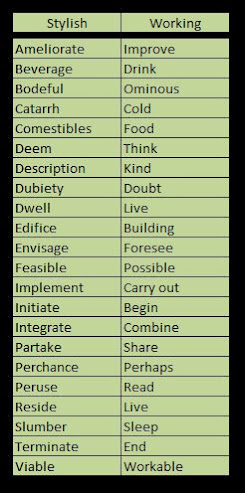Prandial (pronounced pran-dee-uhl)
Of or relating to a meal, especially dinner (sometimes affected,
jocose or facetious).
1810-1820: From the Late Latin prandialis or the Classical Latin prandium (late breakfast; lunch), perhaps from the primitive Indo-European pr̥hemós (first), from prehe- + -edere (to eat) (originally, the primitive Indo-European ed- root (to eat) meant originally "to bite") + the Latin -ium (the suffix forming nouns), ultimately from the primitive Indo-European -yós (suffix forming adjectives from noun stems) + -al (the suffix forming adjectives). It’s never been clear why the meaning shift from the Classical Latin meaning (late breakfast; lunch) to the later (dinner) happened. Now, prandial is used almost exclusively as (a usually jocular or affected) pre-prandial or post-prandial (often plural), a reference to before or after-dinner drinks (ie the various forms of "prandial" have become code for "drinking alcohol"). Prandial is an adjective and prandially is an adverb.
Lindsay Lohan enjoying a pre-pradial.
The first use of the
adjective postprandial (now usually as post-prandial) seems to have been by the poet Samuel
Taylor Coleridge (1772–1834) in 1820 to convey the meaning "happening, said, done etc; after dinner". The first known
instance of preprandial (also pre-prandial) (before dinner) is in a letter of
1822 by the poet Charles Lamb (1775–1834) to Coleridge: “Why you should refuse
twenty guineas per sheet for Blackwood’s or any other magazine passes my poor
comprehension. But, as Strap says, you know best. I have no quarrel with you
about præprandial avocations—so don’t imagine one.”
Prandial, pre-prandial & post-prandial now belong to the roll-call of words described variously as "useless", "potentially misleading" or "pretentious". To invite one's dinner companion to a "post-prandial is harmless if it's between linguistically consenting adults but because many educated people would have no idea what was be suggested, an offer of an "after-dinner drink" is usually a better idea. Despite all that, for some word nerds, the the adverbs preprandially (in a preprandial manner; before a meal, especially dinner) & postprandially (in a postprandial manner; after a meal; especially, after dinner) may prove irresistible.
Henry Fowler’s list of working & stylish words.
The stern Henry Fowler (1858–1933) in his A Dictionary of Modern English Usage (1926) included an entry which listed examples of “working & stylish words” which opened with the passage: “No one, unless he has happened upon this article at a very early stage of his acquaintance with this book, will suppose that the word “stylish” is meant to be laudatory.” He went on to say there was a place for such forms “…when they are used in certain senses…” but made it clear that for most purposes the plain, simple “working word” is the better choice. He offered the example of “deem” which in law has a precise and well understood meaning so is there essential but it’s just an attempt at stylishness if used as a substitute for “think”. Other victims of his disapproving eye included “viable” which he judged quite proper in the papers of biologists describing newly formed organisms but otherwise a clumsy way of trying to assert something was “practicable” and “dwell” & “perchance” which appeared usually as “…conspicuous, like and escaped canary among the sparrows.” Henry Fowler liked stylish phrases but preferred plain words. Fowler completed his text by 1925 and things have since changed, some of the “stylish” cohort seemingly having become “working” words, possibly under the influence of the use in computing and other technologies, their once specialized sense migrating into general use because the language of those industries became so common. Although he did twenty years before the first appeared, one suspects he’d not have found Ferraris “stylish” and would probably have called them “flashy” (in the sense of “vulgar ostentation” rather than “sparkling or brilliant”); dating from the mid sixteenth century, “flashy” would seem to have a suitably venerable lineage.





